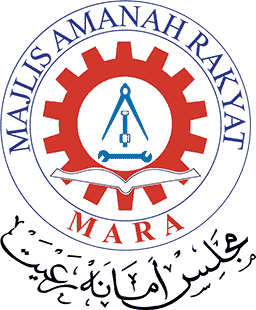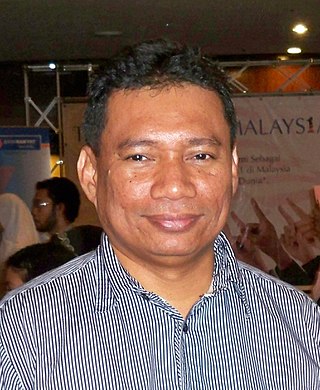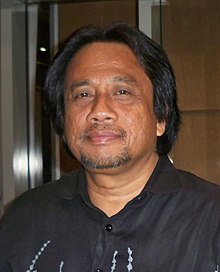
Dewan Bahasa dan Pustaka, abbreviated DBP, is the government body responsible for coordinating the use of the Malay language and Malay-language literature in Malaysia.

Majlis Amanah Rakyat is a Malaysian government agency. It was formed to aid, train, and guide Bumiputra in the areas of business and industry. MARA was formed on 1 March 1966, under the Rural and National Development Ministry.
Keris Mas, born Kamaluddin Muhamad, was a prominent Malaysian literary figure and was one of the founders of the Asas '50 literary movement. His numerous contributions to Malay language literature led him to become Malaysia's first National Laureate in 1981.

Rais bin Yatim is a Malaysian politician and lawyer who served as the 18th President of the Dewan Negara from September 2020 to June 2023, 8th Menteri Besar of Negeri Sembilan from 1978 to 1982 and the Member of Parliament (MP) for Jelebu from November 1999 to May 2013.

The Ministry of Education is a ministry of the Government of Malaysia that is responsible for education system, compulsory education, pre-tertiary education, technical and vocational education and training (TVET), curriculum standard, textbook, standardised test, language policy, translation, selective school, comprehensive school.

Kedahan Malays or commonly known as Orang Utara ('Northerners'), are a sub-group of Malays native to northern Malay Peninsula in areas of both current and historical area of Kedah. They are among the oldest ethnic groups in the Malay peninsula with a history dating back 2,800 years as proven by the discovery of sites in Bujang Valley and historical documents from India, China and Arabia. Kedahan Malays are one of the largest Malay sub-groups in Malaysia, comprising at least 15% of the total Malaysian Malay population including those with Kedahan ancestry.

Hikayat Amir Hamzah is a Malay literary work that chronicles the hero by the name Amir Hamzah. This book is one of the two hikayat mentioned in Sejarah Melayu as one of the hikayat used to encourage Malay warriors in their fight against invading Portuguese in Malacca in 1511.
Khadijah Hashim is a Malaysian writer, teacher and journalist. She has worked as a teacher and also as a journalist with local newspapers Utusan Melayu (1974–1976) and Berita Harian (1976–1985). She is better known as a novelist, and has produced 19 novels. She also expanded her creativity in the field of short stories, radio drama scripts, children's books, rhymes and poetry. The children's rhyme book "Sayang Sayang" has been selected to be on Honour List of the International Board on Books for Young People (IBBY) in Basel, Switzerland (2002) and "Semerbak Poetry" in Macau, China (2006). Khadijah continues her interests in writing rhymes, which led to her latest creation of "Putera-puteri Malaysia".

Wan Osman Wan Awang, also known by his pen name Usman Awang was a Malaysian poet, playwright, novelist and Malaysian National Laureate (1983).

Syed Mohd Zakir Bin Syed Othman Al-Yahya, is a Malaysian writer of prose, poetry, and theatrical texts.

Siti Zainon Ismail is a Malaysian novelist, short story writer, poet, and academic. She is best known for her multi-genre novel, Pulau Renik Ungu.
Perak Malay is one of the Malay dialects spoken within the state of Perak, Malaysia. Although it is neither the official language nor the standard dialect in the whole state of Perak, its existence which co-exists with other major dialects in the state of Perak still plays an important role in maintaining the identity of Perak. In spite of the fact that there are five main dialects traditionally spoken in Perak, only one of which is intended by the name "Perak Malay". There are subtle phonetic, syntactic and lexical distinctions from other major Malay dialects. Perak Malay can be divided into two sub-dialects, Kuala Kangsar and Perak Tengah, named after the daerah (districts) where they are predominantly spoken.

Noordin Hassan is a Malaysian playwright and Malaysian National Laureate.

Ahmad Kamal Abdullah was a Malaysian poet, novelist, playwright, literary critic and Malaysian National Laureate (2011). He was known under the pseudonym Kemala.

Dinsman is a Malaysian poet, playwright and theatre practitioner. Dinsman is his penname, his real name being Che Shamsudin Osman.

Raja Rajeswari Setha Raman is a Malaysian poet and translator. She is Tamil by ethnicity. She is also a lecturer of the Teacher Education Institute, Malay Language Campus.

James T. Collins is an American linguist who works on comparative linguistics, lexicography, and sociolinguistics. Collins specializes primarily in Austronesian languages.
Dr. Mohamed Ghazali bin Abdul Rashid or better known by his pen name Malim Ghozali PK was a Malaysian writer and laureate from Perak. He was crowned as the Sasterawan Perak in 2014. He authored a variety of literary works such as Novels and short stories. He also received numerous awards including the Southeast Asian Writers Award in 2013.

Muslim bin Haji Burut, pen name Muslim Burmat, was a writer from Brunei who wrote a great deal of literature, particularly novels and short stories that are used in Brunei's educational institutions. In addition to receiving numerous literary honours, his works—which are primarily realistic but also include fresh historiography—showcase aspects of Brunei society.
Matussin bin Omar, pen name D. P. Matussin, is a historian, civil servant and writer from Brunei who previously served as the third director of the Brunei Museum from 1987 to 1995. He started writing poetry, short tales, essays, and song lyrics in 1962. Since then, he has established himself as a well-known scholar of Bruneian literature and culture.















